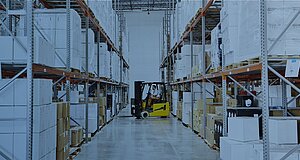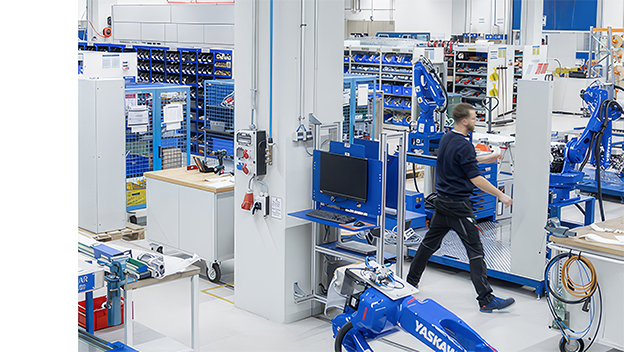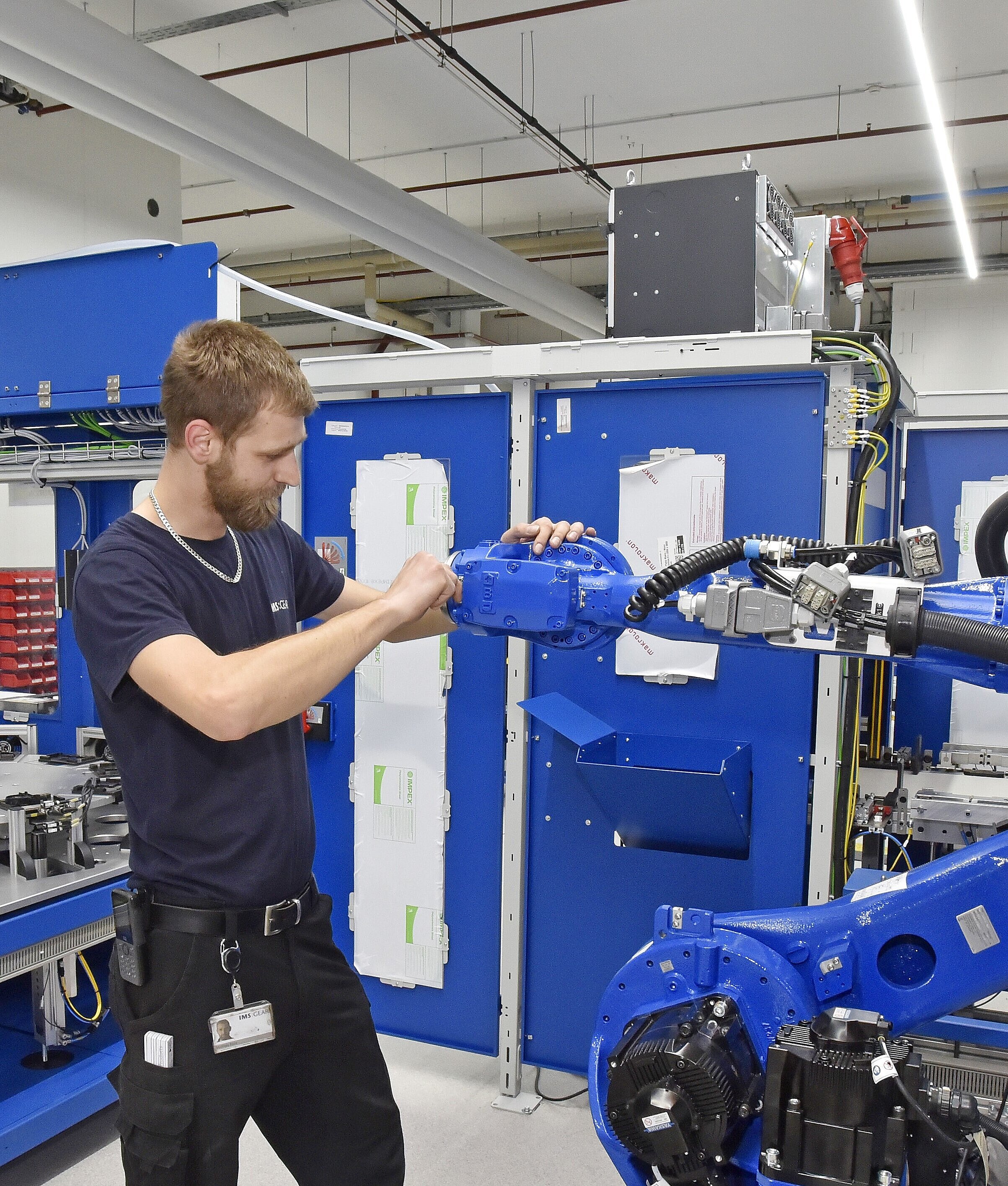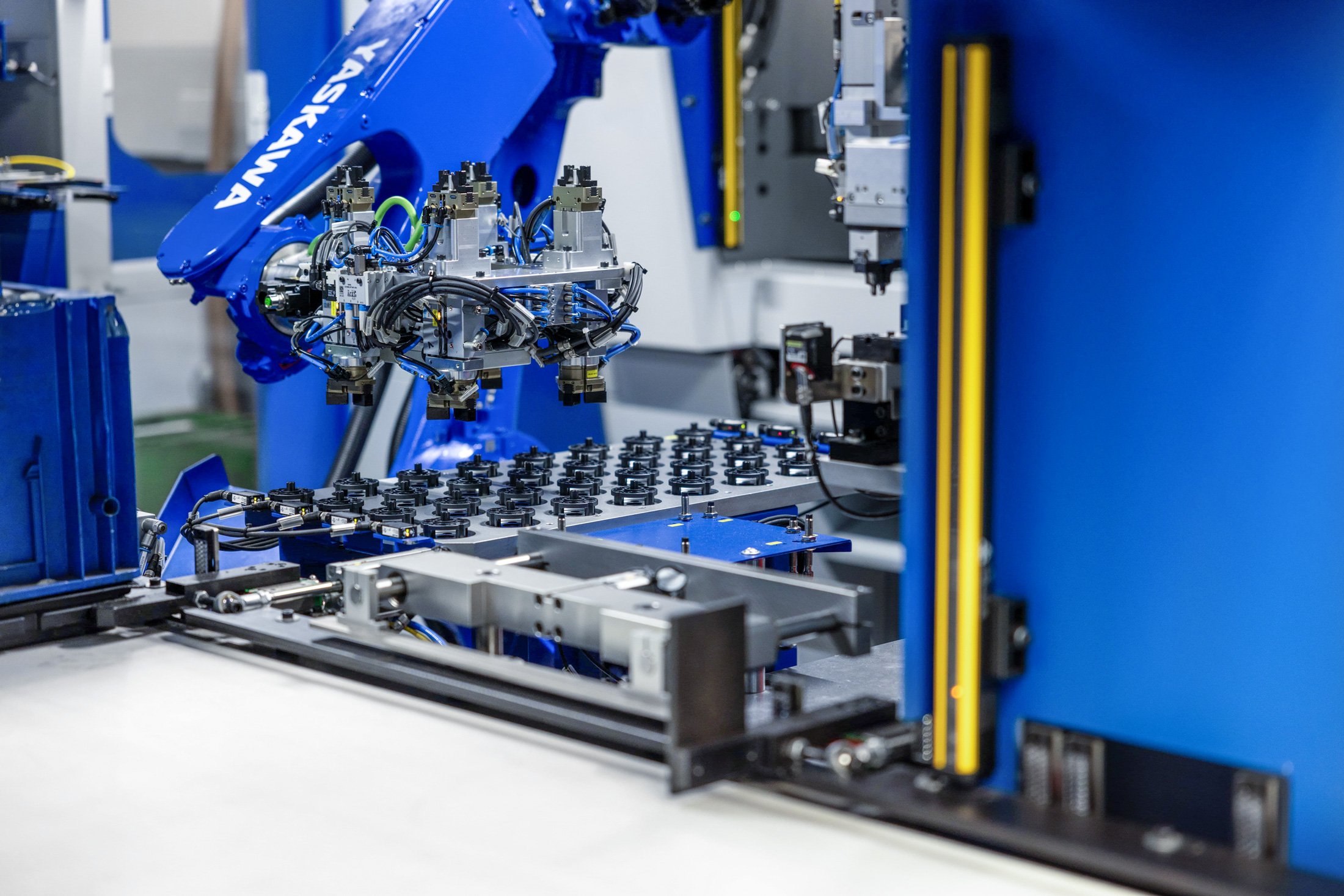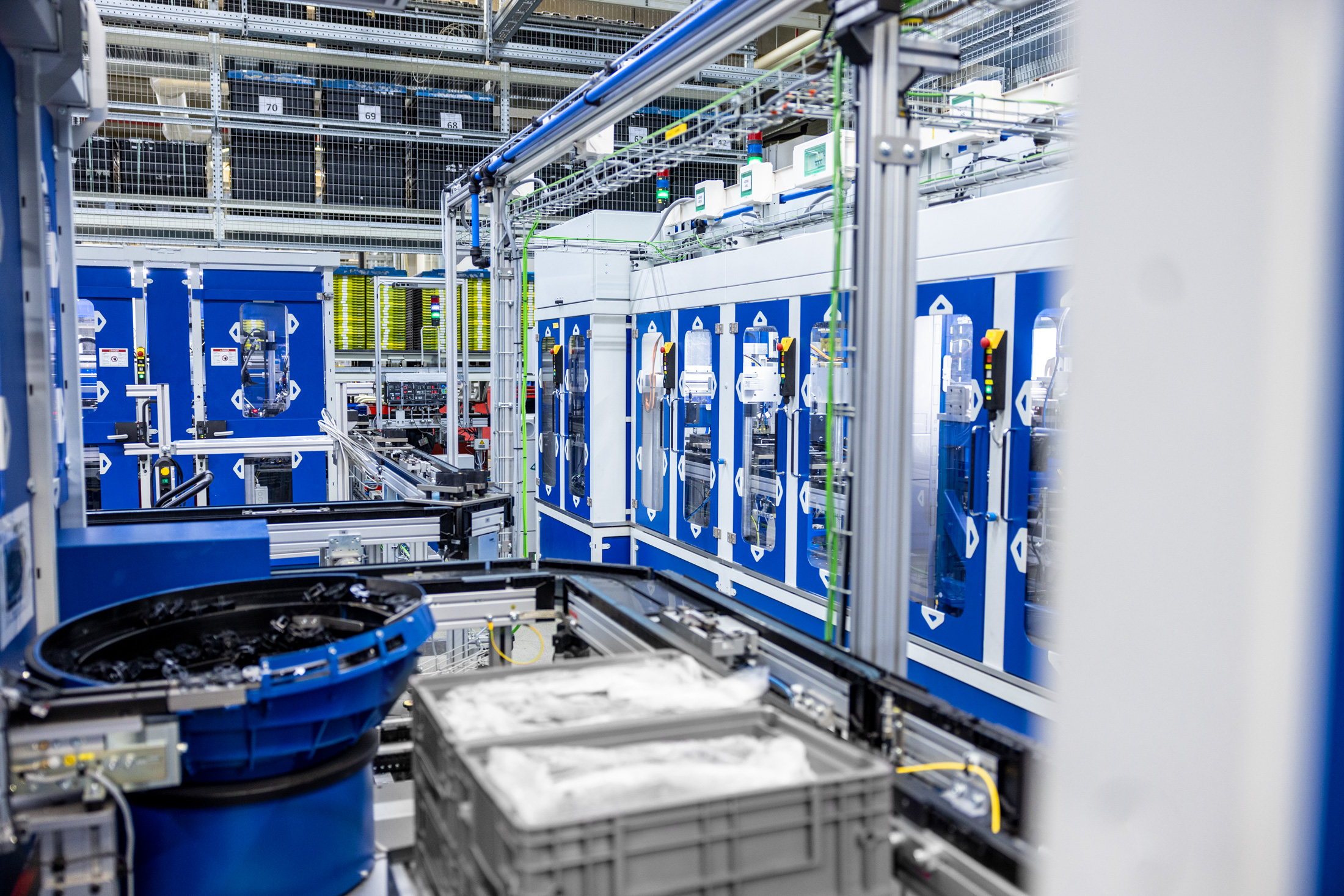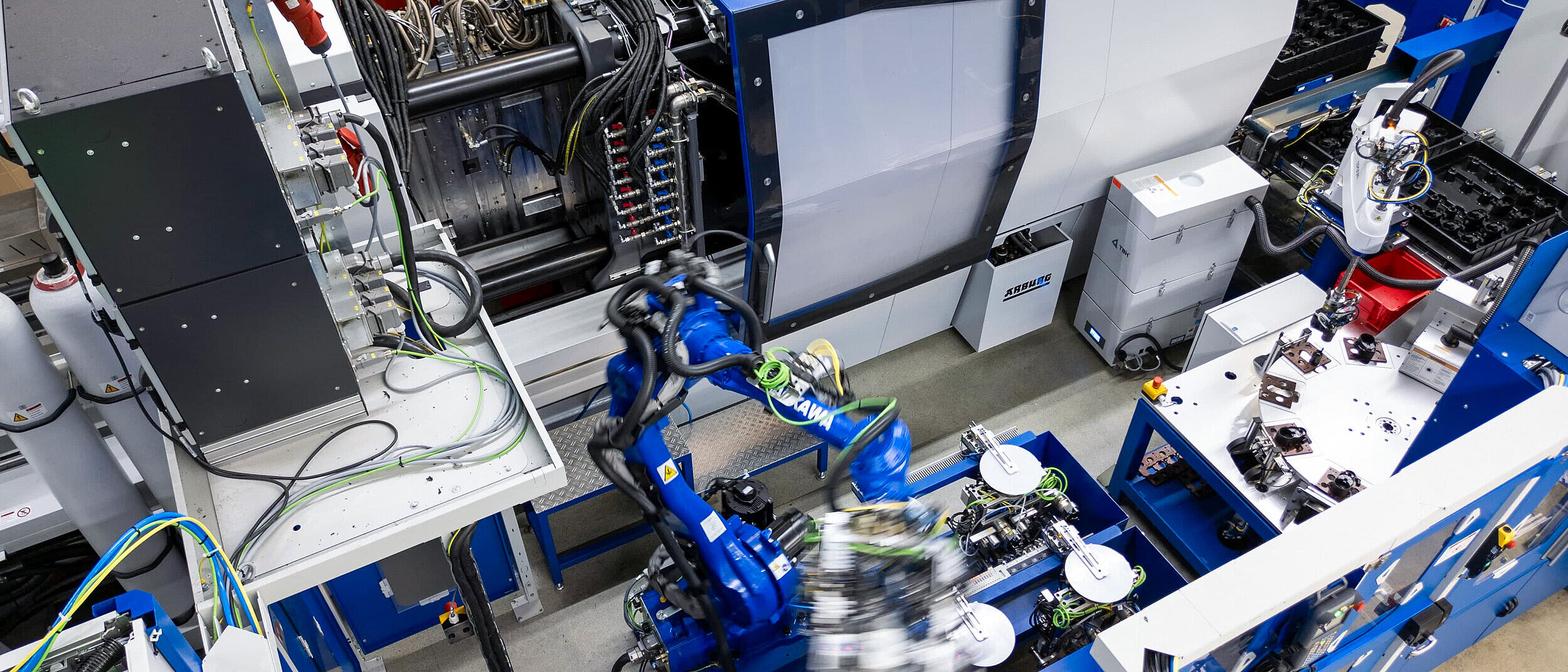You want to add future to your production?
We understand that well. After all, we from IMS Gear have long been at the forefront of developing intelligent automation concepts for the manufacturing of complex small parts. We will be happy to use this competence to your advantage!
We support you with our expertise. Let us talk about your individual requirements!
Let’s Talk About Efficient Automation
Efficient automation processes in metal and plastic production - naturally, this does not only relate to the actual manufacturing and processing of workpieces. The upstream and downstream periphery also plays a major role: From loading and unloading and the transportation of parts to a variety of testing and measuring processes.
For all of this, we from IEA not only have a wealth of experience at our disposal but have also developed proven, tested, and above all customizable process modules.
The Three Columns of our Automation Competence
IEA provides a wide range of services with respect to the automation of manufacturing processes. It is based on a great wealth of experience with automated processes in the production of a great variety of metal and plastic components, with a key competence in the field of complex small parts. This competence is reflected by three columns:
“With more than 30 years of experience, it can be said that we are pretty familiar with the automation of a great variety of production processes. In all these years, we have developed pioneering standards that we can customize and thus provide a benefit for our customers. No matter whether metal or plastic parts, especially when it’s getting complex: We find a solution, with highest efficiency at that - and are ready for your requirements.”
General Manager Industrial Engineering Automation
Automation solutions for industrial parts provision and parts handling
Concepts for the automation of parts provision in the industrial production process for metal and plastic parts depend on how the parts are handled in the subsequent process. A basic distinction is made between batched parts and bulk goods. The differentiation takes into account the size of the partial calculation on the one hand and the question of how they should be available in the next processing step on the other.
Depending on the situation, we at IMS Gear can integrate a wide range of solutions into our automation concepts for providing the parts, picking them up, feeding them into the machining process, removing them and transporting them onwards.
The following are used here:
- Palletizing systems (e.g. parts pre-positioned in trays)
- Vibratory conveyors (e.g. vibratory bowl feeders, linear conveyor systems)
- Bin picking systems (handle in the box)
- Step conveyor
- Sliding tables
- Buffer bunker
- Rotary storage
- Flex feeder systems
- and more
What exactly is industrial automation?
The term industrial automation (often also referred to as "industrial automation") can be understood as an umbrella term for a very broad field of application: One can always speak of industrial automation when human activities in manufacturing or machining processes are substituted by automated machine processes.
This also shows that industrial automation always includes a gradual component: For example, it is possible to automate only certain areas within manufacturing processes (so-called partial automation). A complete industrial production process can also be automated (full automation).
Nearly every modern metal and plastics manufacturing process involves some level of automation. This mainly concerns "simple" insertion and removal activities, but more complex tasks such as measuring and packaging are also often automated. With our Industrial Engineering Automation unit, we at IMS Gear offer our customers the complete range of simple to highly sophisticated automation solutions for their manufacturing processes.
Industrial automation vs. industrial automation: What's the difference?
Many people use the terms "industrial automation" and "industrial automation" largely synonymously. If you take a closer look at the semantics, you can see a difference: Where automation describes the path or process towards the substitution of human activities, the term automation (rather) describes the result of this.
With our Industrial Engineering Automation business division, we at IMS Gear are the perfect partner for the automation of manufacturing processes: Together with our customers, we consider which manufacturing steps and processes can best be automated and how. This can lead to complete automation of the respective manufacturing process, but partially automated solutions are also possible, as described.
What is industrial automation good for?
The implementation of automation solutions in industrial manufacturing processes has several drivers. The two most important are efficiency and quality. Specifically, this implies that automation can offer several advantages in the manufacture or processing of products:
- Qualitative improvement of parts / products
- Reduction of error costs
- Making processes more efficient (leaner)
- Reduce production times
- Increase cycle times and output
- Increase process stability
- Making processes and procedures more transparent
- Relieving employees of monotonous tasks
As an expert in industrial automation, we at IMS Gear advise our customers very closely in the run-up to a project. This enables us to offer individually designed automation solutions depending on the factors mentioned. This is always done with a view to the future (more parts, higher output or expansion of machining processes).
When does industrial automation make sense?
Whether and to what extent a manufacturing or machining process is automated depends primarily on two factors:
- The complexity of the machining processes
The production of metal or plastic components can sometimes be very demanding. As the level of complexity increases, manual processes reach their limits. Automation is a crucial component for the long-term stability and performance of industrial manufacturing processes. This has a direct impact on the competitiveness of companies.
- The volume to be produced (part quantity, cycle times)
The development and implementation of industrial automation solutions is associated with effort. From a business perspective, this can be set in relation to the volumes or quantities (and yields) of the parts produced. Depending on the given, partially automated solutions can be implemented here as well as the complete automation (e.g. for mass-produced items) of an industrial manufacturing process.
Industrial automation: for which manufacturing processes and procedures?
In principle, industrial automation can be used in all manufacturing and finishing processes in metal and plastics production. Since, as described, both complete automation solutions and partial automation can be implemented, a distinction can be made between individual process steps. These are based on the individual process or machining steps of industrial manufacturing processes:
- Parts provision
- Parts handling
- in plastic injection molding production: the thermal process
- Parts processing (e.g. turning, milling, grinding, serrating, rolling with and without robotics)
- Parts cleaning
- Measuring and testing the parts
- Packing parts
At IMS Gear, we offer individual automation solutions for all the processes and procedures mentioned or combine them to create a tailor-made overall concept: we develop individual and customized concepts for industrial manufacturing and assembly automation.
Automation in plastic injection molding processes: What is special?
The automation of production and assembly processes in plastic injection molding can basically be compared to the production of metal parts and assemblies. The key difference is the thermal process, i.e. heating and cooling of the plastic (e.g. PEEK): one of the key challenges in the field of automated plastic injection molding production is to handle a stable manner and to link it efficiently to the upstream and downstream processes (feeding, handling, measuring/testing, packaging).
At IMS Gear, we can offer our customers automated solutions for a wide range of products in the field of plastic manufacturing: From solid plastic parts to complex inserts, plastic-molded stamped parts and hybrid assemblies. Our automation concept follows the specific requirements of each part.
In which areas of industrial automation does IMS Gear have a particular focus?
With our Industrial Engineering Automation business division, we at IMS Gear stand for the entire range of automation solutions in the production and assembly of small parts and assemblies made of metal and/or plastic. The basis for this is the highest level of engineering expertise paired with decades of experience in the field of industrial automation.
Over the years, we have developed certain key areas of expertise that set us apart from our competitors - and which we turn into a direct advantage for our customers.
We are particularly good at
- the feeding of parts for processing
- the handling of parts
- measurement and testing technology
Are you interested in an automation solution for your industrial production or assembly? Contact us directly and let's talk about your requirements in person.
In which areas of industrial automation does IMS Gear have a particular focus?
Grundsätzlich stehen wir von IMS Gear mit unserem Unternehmensbereich Industrial Engineering Automation für die gesamte Bandbreite an Automatisierungslösungen in der Fertigung und Montage von Kleinteilen und Baugruppen aus Metall und/oder Kunststoff. Die Grundlage dafür ist höchste Engineering-Kompetenz gepaart mit jahrzehntelanger Erfahrung im Bereich der Industrie-Automation.
Dabei haben wir im Laufe der Zeit bestimmte Kompetenz-Schwerpunkte ausgebildet, mit denen wir uns gegenüber Wettbewerbern absetzen können – und die wir für unsere Kunden zum direkten Vorteil machen. Besonders gut sind wir etwa bei
- der Zuführung von Teilen zur Bearbeitung
- dem Handling von Teilen
- der Messtechnik und Prüftechnik
Sie haben Interesse an einer Automatisierungslösung für Ihre industrielle Fertigung oder Montage? Dann kommen Sie direkt auf uns zu und lassen uns persönlich über Ihre Anforderungen sprechen.



